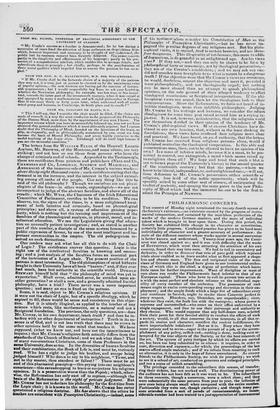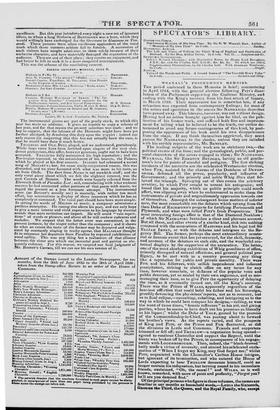PHILHARMONIC CONCERTS.
Tile concert of Monday night terminated the twenty-fourth season of theSociety's existence,—an existence created by the progress of instru- mental composition, and sustained by the matchless perfection of the works of the modern German masters, and the mass of individual talent which is brought to bear upon them. During this period, the Society has exhibited little change in its character or constitution, certainly little progress. Combined practice bus given to its band more individuality of character and a greater accuracy of performance: the style of the different masters whose works appear in annual succession is better known and understood. Twenty-tour years ago, the Conti- nent was closed against us; and it was with difficulty that the works of BEETHOVEN, which were then attracting the attention of his own country, found their way into ours. We had to toil in uncertainty and darkness, in order to discover that vein of pine gold which repeated trials alone enabled us to trace amidst what at first appeared a shape- less and chaotic mass. The free and reciprocal visits of the musi- cians of Germany and England have given to our instrumental orches- tnis, of which this is the chief, a degree of perfection which leaves little room for further improvement. Want of discipline or want of care alone can render the Philharmonic band inferior to that of any European capital. Those who have to call its powers into action do o with the most perfect and absolute reliance on the individual caps- silky of every member of the orchestra. The possession of such means ought to excite corresponding energy and discretion in their em- ployment; and the ample funds which a large list of subscribers every year continues to furnish, ought to resider these Concerts perfect in every respect. Blunders, nay, blemishes, are unpardonable; since,. wherever they exist, the fault lies with the managers; whose power is supreme and uncontrolled—who enter on their office unfettered by a single engagement, and free to use their patronage and authority as they choose. Who would suppose that any half-dozen men, selected from their peers for their fancied ability to conduct the affairs of such a society, would, in all that concerns its true interests, in all that re- gards its station and character, manifest the coolest indifference, the most imperturbable indolence? But so it is. Busy when they have some private end to serve—eager in the pursuit of a Job, or the accom- plishment of any paltry, selfish end—nothing is done, nothing even at- tempted for the true objects of the Society, or for the best interests of the art. The system of petty intrigue by which its affairs are carried on, has been too long submitted to in silence : it requires, in order to cure, dissection and exposure,—for which, the proceedings of the last season afford ample materials; and if we refrain from resorting to such an alternative, it is only in the hope of future amendment. As sincere friends to the Philharmonic Society, we wish its prosperity; we wish to see it a school of art, conducted on generous and enlarged principles, and not a scene of selfish scrambling. The privilege conceded to the subscribers this season, of transfer- ring their tickets, has not worked well. The discriminating power of the audience has not been felt as it was wont to be. The subscnbers to these concerts, though a numerous, were a select class; and. they were substantially the same persons from year to year, the .infusion of new ones being always small when compared with the entire number. Fashionable they were not, though exclusive ; and though many per- sons attended from a sort of parade of connoisseurship, no incon- siderable number had been trained to a just appreciation of instrumental
ACT
Sinfonia in E fltt MOZART.
Cantata. MAda1110 N All ORA AI et " The De- p 'mire frcm Panulise." Composed expresidy for the Philharmonic Soeiety, niul (list time of Performanee H. R. HISOOT. Int roduzione e POLICCA G irerriera. Violin. M. ()Le It. BULL Darn% Madame M A LIB RA N DA BERIOT Mid N. LVANUFF, " In mm a man" (N-erna) BICLAIRt.
Overture. Lcouora BEETHOVEN.
Leader, Mr. L9DER -C011illICIOr. Mr. POTTER.
The instrumental pieces are part of the yearly stock, to which this year has made no addition. It gives no trouble to copy a scheme of last year, arid for that reason the present selection was made : arid we beg to suggest, that the labours of the Directors might have been yet further abridged, by devolving this duty upon the copyist : indeed our only reason for suspecting that this has not actually been the case, is that he would have done it much better.
THALBERG and OLE-BULL played, and we understand, gratuitously. While large MRS have been lavished upon singers of the very slen- derest pretensions, this offer, however generous, ought not to have been accepted. THALBERG fully maintained his high reputation ; and the blotwegian repeated, to the astonishment of his hearers, the Polacca which he played at his first concert. IVANOFF had rehearsed a sacred song of MOZART'S; but, for some easily-conjectured reason, this was discarded, and we were favoured with what was more to his taste, an air from &elk. The duet from Norma is sad mawkish stuff; and the only vocal piece about which we felt the slightest interest, was the new Cantata of BISHOP. The words were happily selected from the Eleventh Book of Paradise Last; and, remembering with what eminent success he had connected other portions of that poem with music, we regard the present as a less fortunate attempt. The instrumental score (as Bistioe's usually are) is masterly, with rather too much effort, too ostentatious a, display of those resources which he has so completely at command. The vocal part should have been more simple. In setting the words of MILTON TO music, a composer adventures a perilous enterprise. He cannot rise above his poet, and can only hope to give a more intense and vivid expression to his language by musical sounds than mere recitation can impart. He will avoid "vain repeti- tions" of words or phrases, and above all he will eschew cadences and roulades. We suspect that the latter error was committed, in the present instance, by the singer rather than the composer ; and it shows to what an extent the taste of the former may be depraved and vulga- rized by constantly singing in trashy operas. that 'WALTMAN thought fit to announce her departure from Paradise by repeated exhibitions of vocal agility. This was any thing but a realization of that alliance between the sister arts which our immortal poet and patriot so elo- quently enforces. For this reason, we suspend our final judgment of Mr. BISHOP'S Cantata, till we can see his own version of it. excellence. But this year introdueed every night • new set of ignorant Idlers, to whom a long Sinfoitiis of BEETHOVEN was a bore, which they would willingly have exchanged for the Overture to Gustavus or Tan- eredi. Those persons were often vociferous applauders of the vocal trash which these concerts seldom fail to furnish. A succession of such visiters have sought admission to them solely because of their exclusive character, and have materially damaged the reputation of the audience. They are out of their place; they receive no enjoyment, and had better be left to seek it in a more congenial entertainment.
This was the scheme of the concluding concert.
EIGHTH CONCERT- MONDAY, TUNE 6.
ACT I.
Sinfonia in P (No. 8) Ilarrnevra.
Aria. N, !estrum Ctn. acet•tni " &elk) Riessint. Second Caprice. Pianoforte. N. 'NIA LOAM). First Pianist to the Emperor of Austria TRAIRE10. • ..ec.tat.vos.Ar.a 1ipLass NOVALLO, Rests, OCALA MOZART.
Overture, Les dear ',townies
()Ls B. Butt,.



























 Previous page
Previous page